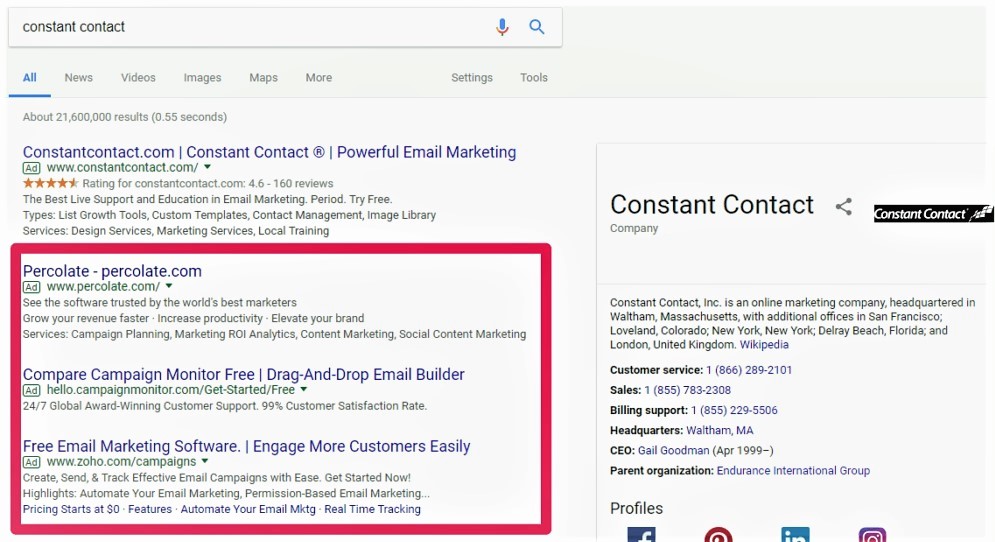
- Track your brand in paid search.
- Set clear terms and conditions for affiliates.
- Use branded campaigns with higher rates in paid search.
- Implement these steps consistently.
Track your brand
When setting up PPC advertising, many companies use branded competitor requests to attract customer traffic. In most cases, this makes sense. While some object, “why should I advertise my own brand, if I am already in the first place in the organic search?” this reasoning is incorrect. In fact, there is conversion traffic coming from paid advertisements.

Commonly, users are inclined to use a certain brand but have no particular loyalty to it. They have learned about the brand through one or more channels and are therefore interested in familiarizing themselves with the product before making a final purchase decision. So they look for it on search engines. Now, suppose at this stage of their investigation, you let them flip over to another site. There’s a good chance they will stop searching as soon as they have found something that will solve their problems. And why shouldn’t they? Nobody has unlimited time.
Obviously, having invested in the development and recognition of your company, and then losing potential customers to competitors is frustrating. Things can get much worse when branded traffic is used to directly mislead users, for example when a copy of your page is used by someone else masquerading as you to inspire trust. Suppose you wanted high-quality Nike sneakers, and ended up inadvertently buying a cheap Chinese fake instead, for the same money. This malicious trend is on the rise. Not only does it tarnish your company’s good name, but it can actually harm your consumers – imagine, for example, that a user is looking for WinRAR, but they end up downloading a virus. It’s up to you to protect your potential customers.
Clear terms and conditions for affiliates
This is fairly straightforward. If you don’t want to lose traffic linked to your own brand, you should inhibit your partners and resellers from using your brand name in paid search engine advertising, or put carefully thought out restrictions in place. Often, brands will pay generous commissions for deals closed by their resellers, but in many cases, the reseller is stealing traffic from the producer themselves.
It’s worth monitoring this to make sure these terms aren’t violated; even if you trust your partners, it might happen unintentionally.
Branded campaign with higher rates in paid search
It might not be entirely ethical, but business is business, and many campaigns are now configured for branded queries. The rules of major search engines do not inhibit algorithms from displaying ads on branded requests. Their policies on the use of trademarks are described in great detail; you cannot use names trademarked by others in your ads, in headers, etc. But there are no actual restrictions on placing ads in response to a user’s search request for a competitor.
Therefore, if you want to make sure your users always land on your site when they are looking for your brand, you should carefully consider your bidding strategy for branded queries. The most important ones should be paid at higher rates so that your own site is returned in the first position if a match is found.
This is especially true for small and medium-sized businesses, where branded queries tend to be low in frequency, industry rivalry is also low, and the cost per click is very low.
The issue becomes particularly critical in industries where the stakes are high. When branded queries are linked to real estate, for example, the loss of a click on a “Residential Complex + (brand name)” request could potentially cost you tens of thousands of dollars in profits.
That being said, a careful approach and strategy are needed. There is little value in using paid advertising for queries such as “(brand name) + reviews”.
Constant implementation
Strategically optimizing your brand’s bidding to protect your name and reputation should be a long-term game. Even if you have done a thorough job today, identifying each and every offending party, blocking them through the Google complaint form to have their ads removed from the search results, That doesn’t mean that they won’t come up with a different variation to top the search results tomorrow. Equally, new rivals could spring up. You need to stay vigilant, as short-term solutions won’t fix long-term problems.
Tracking branded queries is a mandatory part of campaigns for contextual advertising. Failing to stay on top of it is knowingly making a poor investment. Responsible companies stay sharp, protecting themselves and their customers alike.